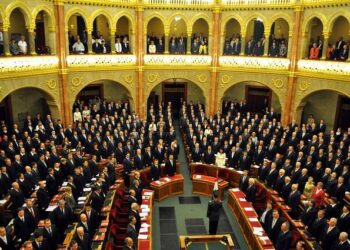Hungary’s conservative government, led by Prime Minister Viktor Orb√°n, has become a focal point of interest and inspiration among some U.S. conservative circles. While supporters praise Orb√°n’s nationalist policies and emphasis on traditional values, critics argue that his administration has steadily eroded democratic institutions, prompting descriptions of Hungary as a “dictatorship.” This complex dynamic highlights the growing ideological divide over governance and democracy both in Europe and the United States.
Hungary’s Political Model Captivates U.S. Conservative Circles
Hungary’s conservative governance has increasingly drawn attention across the Atlantic, with many U.S. right-leaning groups lauding its approach to national sovereignty, family values, and strict immigration policies. The administration, under Viktor Orb√°n, promotes a vision of strong centralized leadership paired with traditional social norms, which resonates with American conservatives seeking models beyond their own borders. Supporters argue that Hungary’s system counters what they see as the excesses of liberal democracy, emphasizing law, order, and national identity preservation.
However, critics warn that this admiration comes with caveats, often labeling Orb√°n’s rule as authoritarian or a “democratic backslide.” Below is a comparison of how key aspects of Hungary’s governance are perceived on either side of the ideological divide:
| Aspect | U.S. Conservative View | Critical Perspective |
|---|---|---|
| Media Control | Necessary for national narrative | Suppresses independent journalism |
| Judicial Independence | Ensures efficient governance | Undermines checks and balances |
| Immigration Policy | Protects cultural integrity | Violates human rights standards |
Examining Authoritarian Practices Under Hungary’s Leadership
Hungary’s political trajectory under Prime Minister Viktor Orb√°n has drawn intense scrutiny as observers debate whether his governance crosses the line into authoritarianism. Critics point to the systematic weakening of judicial independence, the consolidation of media under state-friendly entities, and the manipulation of electoral laws that undermine the principle of fair competition. These measures have effectively curtailed dissenting voices and restricted the power of opposition parties, raising questions about the erosion of democratic norms in favor of centralized control.
- Media Control: Significant portion of news outlets aligns with government narratives.
- Judicial Reforms: Courts face increased political oversight and reduced autonomy.
- Electoral Changes: Redistricting and new voting rules favor the ruling party.
- NGO Restrictions: Increased regulation and stigmatization of civil society groups.
| Year | Key Action | Impact |
|---|---|---|
| 2010 | Constitutional overhaul | Empowered executive branch |
| 2014 | Media consolidation | Reduced press freedom |
| 2018 | Electoral law changes | Advantage for ruling party |
| 2020 | COVID emergency powers | Expanded unilateral rule |
While Orb√°n’s policies are widely criticized internationally, they have simultaneously galvanized right-wing factions abroad, especially in the United States, who admire his unapologetic nationalism and rejection of liberal democratic conventions. This support underscores a growing trend among conservatives seeking alternative governance models that emphasize sovereignty, cultural identity, and strong leadership over pluralism and institutional checks. However, the debate remains fierce, with opponents warning that such admiration risks normalizing autocratic tactics that undermine the foundational principles of democracy.
Implications for American Democracy and Conservative Strategy
The admiration some U.S. conservatives express for Hungary’s leadership marks a significant pivot in how parts of the American right view democracy and political governance. They hail Hungary’s nationalist policies and strongman style as a template for challenging what they perceive as liberal overreach in the United States. This embrace reflects a broader willingness to prioritize cultural and ideological preservation over traditional democratic norms, signaling a shift in the conservative playbook from institutional reform toward more assertive, sometimes controversial, governance models.
Key strategic implications include:
- Emphasizing populist rhetoric that taps into voter frustrations with the establishment.
- Undermining media and judicial independence to consolidate power, as seen in Budapest.
- Utilizing legislative majorities to reshape electoral laws and limit opposition influence.
- Pushing nationalist cultural agendas while framing them as defense of national sovereignty.
| Conservative Strategy Aspect | Hungary Model | Potential U.S. Adaptation |
|---|---|---|
| Media Control | Government-aligned outlets dominate | Increased regulatory pressure on mainstream media |
| Judicial Influence | Reform courts to favor ruling party | Push to reshape judiciary appointments |
| Electoral Changes | Gerrymandering & new voting laws | State-level efforts to adjust election rules |
| Nationalism | Focus on cultural unity and immigration limits | Heightened immigration rhetoric and policies |
In Conclusion
As debates over the future of democracy continue in the United States, Hungary’s political trajectory offers a stark, controversial example. While some U.S. conservatives view Prime Minister Viktor Orb√°n’s governance as a model of strong leadership and national sovereignty, critics warn of growing authoritarian tendencies that challenge fundamental democratic principles. The evolving relationship between Hungary and American conservative politics underscores the complex global dialogue on governance, freedom, and the limits of political power.
















